Cayman Net News “inaccurately claimed that Landmark’s founder lives in the Cayman Islands mischaracterized Landmark Education and its program The Landmark Forum, ” says Art Schreiber, General Counsel for the private for-profit company Landmark Education.
 However, Schreiber has a tendency to carefully parse his language in a way that often seems deliberately misleading.
However, Schreiber has a tendency to carefully parse his language in a way that often seems deliberately misleading.
In the same statement Schreiber insists that “Landmark Education was not formerly known as EST (Erhard Seminars Training).”
EST was founded by Werner Erhard, also known as Jack Rosenberg a former used car salesman without meaningful academic or professional credentials, and was sold in 1992. Eventually the newly formed company came to be called “Landmark Education” and has been run ever Erhard’s brother Harry Rosenberg ever since.
And a licensing agreement provided payments to Erhard for his “technology” eventually paid by Landmark.
Schreiber himself is an old crony of Werner Erhard’s, an association that dates back to the days of EST.
Apparently, Mr. Schreiber has conveniently chosen to forget and omit this history so he can say that “Landmark’s founder” does not live in Georgetown as reported by New York Magazine in 2001.
However, this seems just a bit disingenuous, which seems to have become a particular penchant of Landmark’s General Counsel.
In fact, despite Schreiber’s effort to obscure it, Landmark has a deeply troubled history of bad press and persistent complaints. And the company has frequently been accused of “brainwashing” its program participants and its staff not so flatteringly referred to as “mindbreakers.”
Clinical psychologists and experts in the type of mass marathon training sold by companies like Landmark have noted the structural problems that appear to be inherent within such seminars. These problems have at times been linked to what can be seen as psychological casualties.
Landmark Education has also been sued for personal injuries repeatedly and in one lawsuit for wrongful death.
Art Schreiber as Landmark’s lawyer has often threatened media outlets and individuals with litigation in an apparent effort to silence his employer’s critics.
CultNews was targeted by just such a campaign of that eventually led to a lawsuit filed against this Web site.
But in a humiliating turn of events Landmark eventually dismissed its own lawsuit, rather than submit to open discovery.
 The following is an excerpt from an introduction to an archive about Landmark’s litigation. This introduction was written by noted attorneys Peter Skolnik and Michael Norwick of Lowenstein Sandler, a prestigious New Jersey law firm that defeated Landmark, and sent its lawyers scurrying from a New Jersey federal court.
The following is an excerpt from an introduction to an archive about Landmark’s litigation. This introduction was written by noted attorneys Peter Skolnik and Michael Norwick of Lowenstein Sandler, a prestigious New Jersey law firm that defeated Landmark, and sent its lawyers scurrying from a New Jersey federal court.
“Landmark, like Erhard before it, has repeatedly used litigation and threats of litigation as an improper tool to silence its vocal public critics. This type of lawsuit — typically accusing the defendant of defamation and related torts — is known in various American jurisdictions as a SLAPP suit: i.e., a Strategic Lawsuit Against Public Participation; a lawsuit brought not for its merits, but for the specific purpose of silencing a vocal critic, often one who is unlikely to have the financial resources to defend himself. Given Landmark’s history of filing such lawsuits, it came as no surprise that Ross’s website would enter Landmark’s litigation cross hairs. The democratizing effect of the internet has endowed this website, practically a one-man operation, with the same publishing power and reach as Landmark, a multi-million dollar for-profit corporation. The popular search engine, Google, which ranks web sites by popularity and not financial means, lists www.culteducation.com as #2 on the search term “Landmark Education,” right behind Landmark’s own website. Thus, persons seeking information about Landmark’s programs have easy access to both the information provided on Landmark’s website, as well as the contra point-of-view about Landmark often expressed here.”
“As was reported here nearly a year-and-a-half ago, Landmark and its related companies sued Ross on June 25, 2004, based upon allegedly disparaging statements made about Landmark on www.culteducation.com, www.cultnews.com, and www.culteducation.com. In its Complaint, Landmark charged that allegedly false and disparaging comments made on Ross’s website and statements made by Ross to the media constituted, among other things, product disparagement, tortious interference, consumer fraud and unfair competition. Although much of the material complained about by Landmark consisted of visitor comments, personal stories and bulletin board messages written by users of the website, Landmark’s complaint made the baseless accusation that these statements were actually authored by Rick Ross under false pseudonyms. Cited among comments about Landmark attributed to Ross were that:
“commentaries accuse Landmark of hypnotizing’ and brainwashing’ participants, attempting cult recruitment’ and mind control’ and of constituting cultish-ness.’” (Complaint ¶ 18)
“Landmark’s program make a deliberate assault on your mind;’ . . . Landmark’s programs are downright dangerous’ and destructive,’ Landmark’s programs are designed to make participants vulnerable to suggestion;’ Landmark’s programs have cult attributes;’ and Landmark’s programs are a form of subtle brainwashing.’” (Complaint ¶ 22)
“Defendants made false charges that Landmark participants endured days of bullying’ and humiliation.’” (Complaint ¶ 18 (c)).
“Participants are subject to total “control . . . from the moment [they] are in that room.”’” Complaint ¶ 22 (2) and “Landmark representative exhibited a reluctance to allow toilet breaks.’” (Complaint ¶ 18 (j)).
These are among the same allegations and opinions about Landmark that its critics have published for years, and for which Landmark has repeatedly sued or threatened to sue. Indeed, Landmark itself has been sued a number of times for personal injuries alleged to have arisen out of its programs.”
The pivotal point in this frivolous lawsuit occurred when a federal judge “refused to stipulate to a protective order that would have kept Landmark’s internal documents confidential and hidden from public view. Although Landmark took preliminary steps to have its training manuals and other documents kept confidential, (see letter) Landmark came to understand that the law has recently begun looking far less favorably on orders protecting the disclosure of evidence produced in litigation, and that if motion practice for discovery ensued, Landmark would likely be required to disclose publicly documents that it recognized would not only damage its case, but would further establish that its complaint was, from the outset, brought in bad faith.”
Lowenstein and Sandler “learned from papers filed in Landmark’s litigation against Self Magazine that Landmark’s own training manuals directly contradict the allegations made in Landmark’s complaint against Ross, and entirely support the comments on Ross’s website that Landmark claimed were disparaging. For example, in their Complaint against Ross, Landmark alleges that:
“Defendants made false charges that Landmark participants endured days of bullying’ and humiliation.’” Complaint ¶ 18 (c).
But Landmark’s own training manuals for its Forum Supervisors state:
“a Landmark Forum Supervisor’ needs to be an s.o.b. for impeccability. you need to give up a concern for being liked. . . . Be a destroyer. . . . ” and “Don’t ever let people move or stand up or talk before you have declared the start of the break. Don’t ever let stuff like that go by. Ever, ever, ever.” Furthermore, in Landmark’s Complaint, it attributes to Ross comments such as: Furthermore, in Landmark’s Complaint, it attributes to Ross comments such as: “the Landmark Forum is a very stressful process that is not for everyone;’” (Complaint ¶ 41(a));
Furthermore, in Landmark’s Complaint, it attributes to Ross comments such as: “the Landmark Forum is a very stressful process that is not for everyone;’” (Complaint ¶ 41(a)); Yet, Landmark’s own warnings and disclaimers in its application for the Landmark Forum state:
. . . people will from time to time cry or experience headaches, tiredness, nausea, confusion, disappointment, feelings of anxiety, uncertainty, and hopelessness. Some participants may find the Program physically, mentally, and emotionally stressful.”
See, e.g, Application Form produced in a Texas lawsuit against Landmark in 1997, Neff v. Landmark Education Corp. Continued discovery in this case might have forced Landmark publicly to disclose the information and related documents that led Landmark to require participants in its programs to sign and acknowledge these disclaimers. Much of what we uncovered about Landmark’s internal documents directly contradicting the allegations.'”Continued discovery in this case might have forced Landmark publicly to disclose the information and related documents that led Landmark to require participants in its programs to sign and acknowledge these disclaimers. Much of what we uncovered about Landmark’s internal documents directly contradicting the allegations.'”Did Landmark Education and Art Schreiber attempt to intimidate and/or bully Cayman Net News?
Continued discovery in this case might have forced Landmark publicly to disclose the information and related documents that led Landmark to require participants in its programs to sign and acknowledge these disclaimers. Much of what we uncovered about Landmark’s internal documents directly contradicting the allegations.'”Did Landmark Education and Art Schreiber attempt to intimidate and/or bully This has been the familiar pattern before. That is, when the private for-profit company and its lead lawyer don’t like something said and/or anticipate a critical article may be published, they have been known to essentially bully reporters and/or their publishers.
CultNews will not be bullied by either Schreiber or his employer Landmark and the Ross Institute database will continue to provide meaningful information about the company and its practices.
 Thankfully there are law firms like Lowenstein Sandler and lawyers such as Skolnik and Norwick that care deeply about the First Amendment and are willing to provide pro bono legal assistance to protect it.
Thankfully there are law firms like Lowenstein Sandler and lawyers such as Skolnik and Norwick that care deeply about the First Amendment and are willing to provide pro bono legal assistance to protect it.
CultNews and the Ross Institute have been sued five times by groups or individuals that apparently hoped to silence and/or purge this Web site of critical information.
First, in Arizona by the so-called “Church of Immortal Consciousness.”
Later, by Judy Hammond and her “Pure Bride Ministries.”
And also by the “Gentle Wind Project” of Maine.
Four of those five lawsuits were dismissed without ever going to trial. A fifth, filed by a group similar to Landmark called NXIVM has recently been moved from federal court in New York to New Jersey.
Lowenstein Sandler is now local counsel in that case, along with long-time pro bono lawyers Douglas Brooks of Boston and Thomas Gleason of Albany, New York.
Groups called “cults” or “cult-like” have frequently sued critics historically and succeeded in silencing some, such as the former Cult Awareness Network, which was put closed down and then taken over by Scientology lawyers.
CutNews makes this promise, to keep reporting the facts despite threats from such groups and would-be bullies like Art Schreiber.
 The New York Post reports that “Cruise’s cronies seem to have put a lot of effort into skewing a Parade magazine poll in his favor.”
The New York Post reports that “Cruise’s cronies seem to have put a lot of effort into skewing a Parade magazine poll in his favor.” After all, the actor is Scientology’s “Top Gun,” and the organization must be concerned about one of its most important assets. Cruise often acts like a never ending “Eveready Energizer Bunny” promoting the controversial church at almost any opportunity, whether its curing drug addicts or dyslexia Cruise’s answer is almost always Scientology.
After all, the actor is Scientology’s “Top Gun,” and the organization must be concerned about one of its most important assets. Cruise often acts like a never ending “Eveready Energizer Bunny” promoting the controversial church at almost any opportunity, whether its curing drug addicts or dyslexia Cruise’s answer is almost always Scientology.


 CultNews has previously reported about the
CultNews has previously reported about the 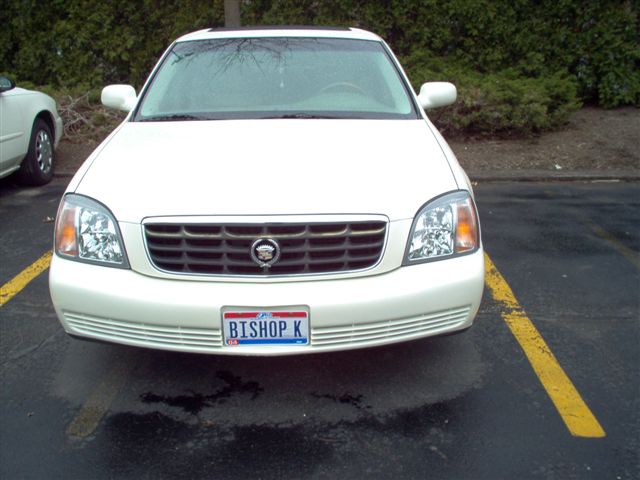 However, unlike Jesus who rode into Jerusalem on the back of a donkey, Keyes prefers his pearl white Cadilac, with custom plates that read “Bishop K,” reflecting his self-proclaimed title of “Bishop Keyes.”
However, unlike Jesus who rode into Jerusalem on the back of a donkey, Keyes prefers his pearl white Cadilac, with custom plates that read “Bishop K,” reflecting his self-proclaimed title of “Bishop Keyes.”  Some of those children have been subjected to brutal beatings by so-called “deliverance teams.”
Some of those children have been subjected to brutal beatings by so-called “deliverance teams.”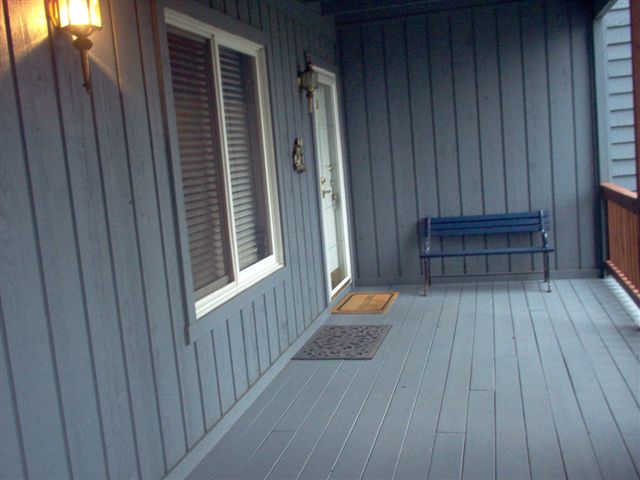 Witnesses have told CultNews that Keyes has been known to have multiple women sleep with him, while devoted female followers lay strewn around his bed on the floor through the night.
Witnesses have told CultNews that Keyes has been known to have multiple women sleep with him, while devoted female followers lay strewn around his bed on the floor through the night. This group was known in Chattanooga through its business the “Yellow Deli” during the 1970s. And was led by former carnival barker turned “prophet,” Elbert Eugene Spriggs, who reportedly now lives in Asheville, N.C.
This group was known in Chattanooga through its business the “Yellow Deli” during the 1970s. And was led by former carnival barker turned “prophet,” Elbert Eugene Spriggs, who reportedly now lives in Asheville, N.C.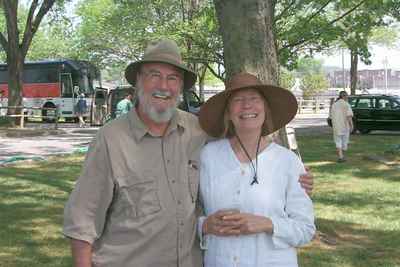 Twelve Tribes is planning to reopen its “Yellow Deli” in Chattanooga and has
Twelve Tribes is planning to reopen its “Yellow Deli” in Chattanooga and has 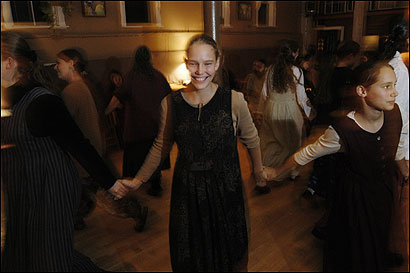 Twelve Tribes kids typically do not attend public schools and begin working at an early age. Authorities in New York
Twelve Tribes kids typically do not attend public schools and begin working at an early age. Authorities in New York  Apparently, Garofalo either didn’t understand or didn’t care about the often-reported links between the privately-funded “New York Rescue Workers Detoxification Project” touted on her Friday night show and
Apparently, Garofalo either didn’t understand or didn’t care about the often-reported links between the privately-funded “New York Rescue Workers Detoxification Project” touted on her Friday night show and  Doctors at the California Department of Health Services accused HealthMed of making “false medical claims” and of “taking advantage of the fears of workers and the public about toxic chemicals and their potential health effects, including cancer.”
Doctors at the California Department of Health Services accused HealthMed of making “false medical claims” and of “taking advantage of the fears of workers and the public about toxic chemicals and their potential health effects, including cancer.” Specifically, Americans are twice as likely to view Islam favorably than
Specifically, Americans are twice as likely to view Islam favorably than 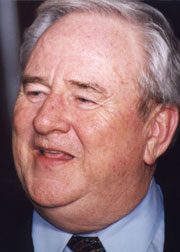 Other faiths ranked are also follows; 58% had a favorable impression of Protestantism, 48% of Catholicism, 47% of the Jewish religion, 31% of Christian fundamentalist religions and 20% of the Mormon religion.
Other faiths ranked are also follows; 58% had a favorable impression of Protestantism, 48% of Catholicism, 47% of the Jewish religion, 31% of Christian fundamentalist religions and 20% of the Mormon religion.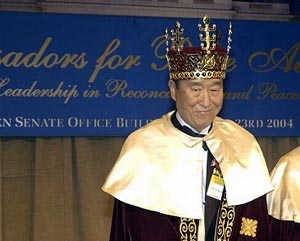 Moon even
Moon even  Rev. Moon’s fish businesses operate under a nonprofit umbrella called “Unification Church International Inc.” (UCI)
Rev. Moon’s fish businesses operate under a nonprofit umbrella called “Unification Church International Inc.” (UCI) 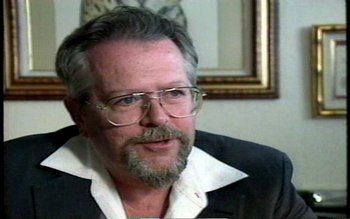 But serious journalists have often found Melton’s expertise a bit biased to say the least and he has been called a “
But serious journalists have often found Melton’s expertise a bit biased to say the least and he has been called a “ Sahagun didn’t report about the cash Melton has received, but did find the space to discuss Melton’s “fascination with vampires.” The supposed scholar once was paid to testify in court about “vampire and werewolf relationships.” An attorney that worked with Melton lauded his ability to recall examples off the top of his head.
Sahagun didn’t report about the cash Melton has received, but did find the space to discuss Melton’s “fascination with vampires.” The supposed scholar once was paid to testify in court about “vampire and werewolf relationships.” An attorney that worked with Melton lauded his ability to recall examples off the top of his head. However, Schreiber has a tendency to carefully parse his language in a way that often seems deliberately misleading.
However, Schreiber has a tendency to carefully parse his language in a way that often seems deliberately misleading. The following is an excerpt from
The following is an excerpt from  Thankfully there are law firms like Lowenstein Sandler and lawyers such as Skolnik and Norwick that care deeply about the First Amendment and are willing to provide pro bono legal assistance to protect it.
Thankfully there are law firms like Lowenstein Sandler and lawyers such as Skolnik and Norwick that care deeply about the First Amendment and are willing to provide pro bono legal assistance to protect it. During the performance the former man who now lives as a woman says she was “kicked out of
During the performance the former man who now lives as a woman says she was “kicked out of 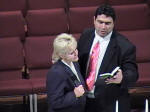 These programs are typically staged within evangelical and fundamentalist churches where JFJ puts on the program and then profits from contributions.
These programs are typically staged within evangelical and fundamentalist churches where JFJ puts on the program and then profits from contributions. Needless to say Christian missionaries parading about, as “Jews” for Passover doesn’t exactly inspire enthusiasm amongst Jews, who most often observe its
Needless to say Christian missionaries parading about, as “Jews” for Passover doesn’t exactly inspire enthusiasm amongst Jews, who most often observe its 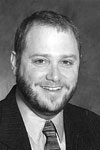 However, Rosen’s successor as the top “Jew” at JFJ, David Brickner, was recently
However, Rosen’s successor as the top “Jew” at JFJ, David Brickner, was recently 